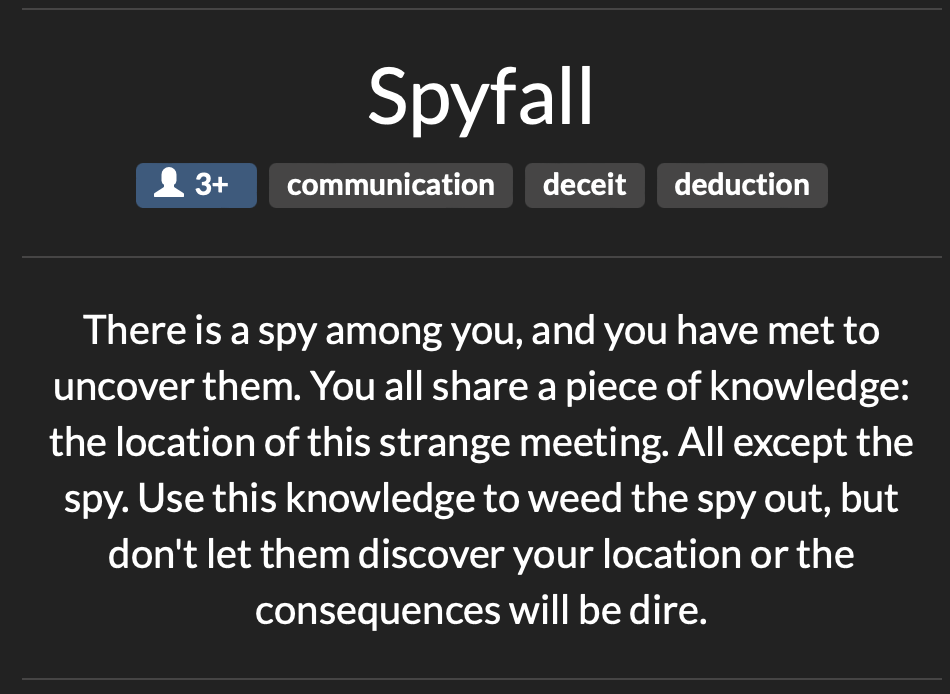Spyfall is a unilateral competition game originally created by Alexandr Ushan in 2014. Recently, it was adapted into a web version by Luke Tsekouras on his website netgames.io. As extrapolated from the “About” section on his webiste, Tsekouras created netgames.io so that people can play board games with each other from anywhere in the world, so the target audience of his platform is likely groups of friends that enjoy board games but either can’t play in the same physical location or prefer the cleanliness of the virtual interface.
Tsekouras’ version of Spyfall can be played with 3 or more people. Each game consists of a setup phase where one player is secretly designated as the spy and the remaining players receive the location that a secret meeting is taking place for that game. Players then question each other about the location with the goal of uncovering the spy (who doesn’t know the location). Questioning proceeds such that the last person questioned chooses someone else to question next. By the end of the questioning, players vote on who they think the spy is, with voting ending once consensus is reached. If they guess incorrectly, the spy wins. If correct, the spy gets one last chance to win if they can correctly guess what the location was from the list of potential locations available to all players. Because of this, players must carefully craft their questions to either clear or expose other players without revealing the location.
“…there is always room for me to get better by thinking of more clever questions.”
The game emphasizes fellowship and challenge, with some elements of fantasy and discovery. Compared to other games in this genre of social spy games such as The Resistance or Secret Hitler, Spyfall is quite simple, making it easy for new players to learn the game in less than a minute and begin playing immediately. Typically, simple games suffer from a lack of repeatability since there are a limited amount of possible variations, but Spyfall’s reliance on creativity in creating questions keeps the game fresh over many plays. Additionally, locations could always be removed or added to create variability.
I thoroughly enjoyed playing this game with my team. What made it most fun for me was the interpersonal dynamics, like when someone answered a question in a strange way, but it was clear they still knew the location. The grand reveal at the end was also very exciting. Unfortunately, we had to abort multiple games because we added new players that accidentally revealed the location or didn’t remember the location. Perhaps because the game is so simple, we didn’t feel the need to clearly explain it to new players, so they ruined a couple games, including the only one where I was a spy.
To improve the game, I would add a way to view the location again for non-spy players after the setup phase. This could add another wrinkle to the game as well, since the spy could try to bluff by pretending to check the location as if they had forgotten. I would also add a cap on the number of players. We started playing with around 7 people, and by the last round, we had expanded to 12 people. By that size, it became very difficult to remember everyone’s questions and answers, and there was a lot more passive observation since only one question can be asked at a time.
Overall, I really enjoyed the game since I felt confident playing for the first time, but there is always room for me to get better by thinking of more clever questions. The group I’m playing with would definitely impact my experience, but I could appreciate that even with strangers, I would enjoy myself playing Spyfall.



